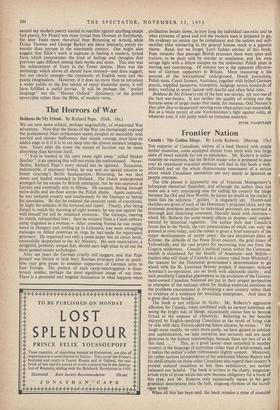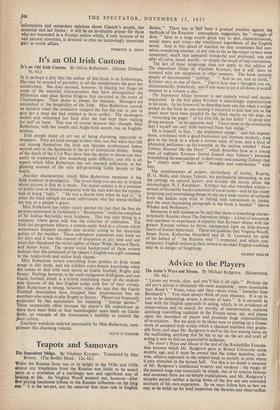Frontier Nation
Canada : The Golden Hinge. By Leslie Roberts. (Harrap. 15s.) THE majority of Canadians, natives of a land blessed with ample timber resources, come equipped almost from birth with two large slabs of wood suitable for use as epaulettes. Mr. Roberts is unfor- tunately no exception, but the British reader who is prepared to pass over an occasional truculent outburst will find in this book a well- informed and on the whole dispassionate assessment of a nation about which Canadians themselves are very nearly as ignorant as people overseas. The title phrase is apparently one of Viscount Montgomery's infrequent rhetorical flourishes, and although the author does not make out a very convincing case for calling his country the hinge between the Old and New Worlds, he leaves no doubt in the reader's mind that the adjective " golden "is singularly apt. Thumb-nail sketches are given of each of the Dominion's principal cities, and the economic problems peculiar to individual provinces are accorded a thorough and discerning treatment, liberally laced with statistics— which Mr. Roberts for some reason affects to despise—and supple- mented by historical vignettes. The author feels that Canada's future lies in the North, the vast potentialities of which can only be guessed at even today, and the reader is given a brief summary of the major developments of recent years : the new aluminium plant at Kitimat, the oilfields of the Peace River country, the gold mines of Yellowknife, and the vast project for recovering iron ore from the Ungava wilderness. Canada's political status within the Common- wealth is elucidated for the benefit of American—and British— readers who still think of Canada as a colony ruled from Whitehall ; the reasons for the Dominion government's determination to go ahead with the St. Lawrence Seaway project, if necessary without America's co-operation, are set forth with admirable clarity ; and such peculiarly Canadian phenomena as the evolution of the Govern- ment-owned Canadian National are put in their proper perspective as examples of the national talent for finding empirical solutions to the problems encountered in developing a new country rather than as evidence of a weakness for socialistic enterprises. And there is a great deal more besides.
The book is not without its faults : Mr. Roberts's aggressive affection for Canada, when combined with an earnest insistence on seeing the bright side of things, occasionally causes him to become lyrical at the expense of objectivity. Referring to the benefits enjoyed by English-speaking Canadians as the result of living side by side with their French-speaking fellow citizens, he writes : " We laugh more readily, we relax more easily, we have gained in subtlety and sophistication, we take ourselves less seriously and are more generous in the human relationships, because there are two of us in this land...." This, as a great lawyer once remarked in another context, is the language of aspiration rather than of achievement, and it makes the author's other enthusiasms slightly suspect. Moreover, his rather curious interpretation of the celebrated Massey Report and his shrill attacks on those other Canadians who regard their country's present cultural condition as less than satisfactory, are neither balanced nor helpful. The book is written in the chatty, magazine- article style of prose which has now become obligatory for a book of this type, and Mr. Roberts only occasionally lapses in his geo- graphical descriptions into the lush, singsong rhythms of the travel= ogue script.
When all this has been said, the book remains a mine of essential
information and outspoken opinions about Canada's people, her economy and her future ; it will be an invaluable primer for those who are interested in a frontier nation which, if only because of its vast natural resources, is destined to play an increasingly important 'part in world affairs.
DESMOND E. HENN

































 Previous page
Previous page